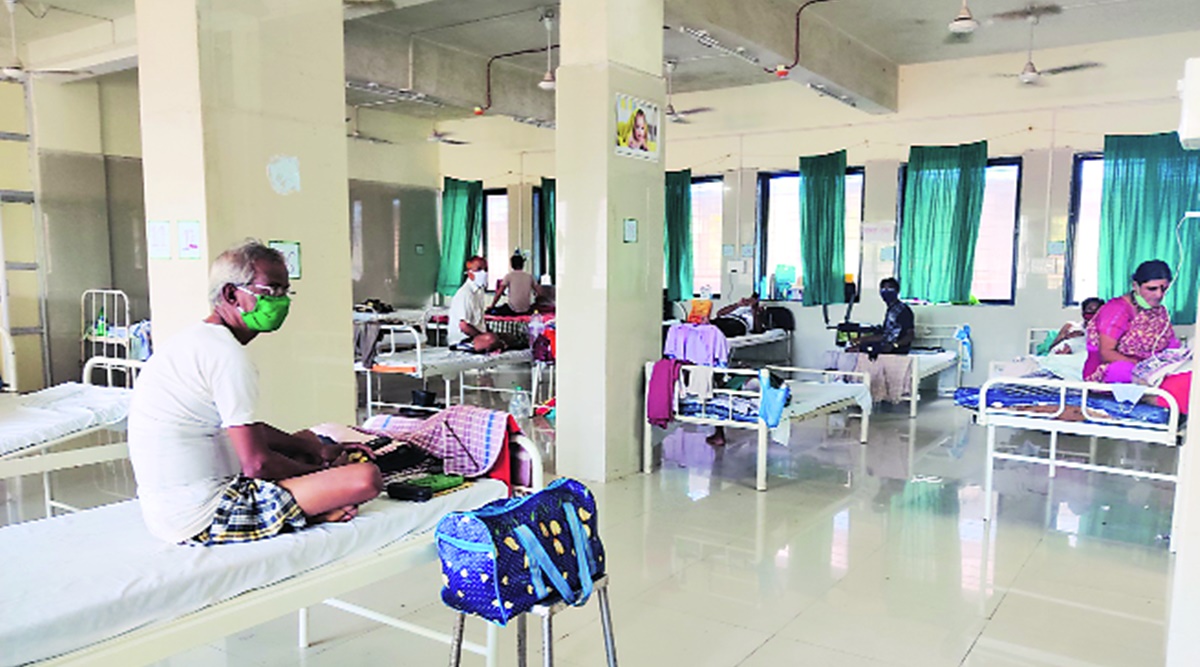 At the Ratnagiri Civil Hospital isolation ward, where relatives pitch in to help with patients. (Express Photo by Tabassum Barnagarwala)
At the Ratnagiri Civil Hospital isolation ward, where relatives pitch in to help with patients. (Express Photo by Tabassum Barnagarwala)Imran Solkar remembers when the first case of Covid-19 came to Rajiwada, a fishing village hugging the coastline in Ratnagiri district of Maharashtra, in March, through a Tablighi Jamaat contact. The communal allegations that followed, apart from social stigma and lack of faith in government health workers, drove people into their huts. They simply refused to disclose if they had any coronavirus symptoms. A few fishermen eventually converted a zilla parishad school into a fever clinic, pooled in three private doctors to provide treatment, and counsel those in need of hospitalisation.
However, horror stories of those who found themselves in government facilities still kept people from coming forward for testing. In August, Ali Pagarkar (72) of Rajiwada refused to give samples for Covid-19 despite fever, acute weakness and a chest CT scan showing pneumonia. When he finally agreed and was taken to the Civil Hospital after testing positive, Solkar says, he came back scarred. For 10 days that he spent in the ICU, Pagalkar would say, his clothes were not changed, no ward boy would feed or touch him, while the same helper who took care of dead bodies would bring his food and water without changing gloves.
The fear isn’t confined to villages where there are limited facilities. State epidemiologist Dr Pradeep Awate says that 40 per cent of the patients who succumbed to Covid-19 in Maharashtra died within 24 hours of hospitalisation, indicating they reached after turning critical. Awareness about coronavirus remains low, and patients do not take the disease seriously until severe symptoms emerge, he says. “District planning has not taken care of these issues. For us they are small problems, but they define a patient’s behaviour.”
Ratnagiri district’s case fatality rate stands at 3% (double the national average), with 100 new cases every day. It is still one of the few districts in Maharashtra with less than 10,000 cases, but corporator Suhail Mukadam fears that might be due to the unwillingness of villagers to get tested.
General physician Atish Khanvilkar, who has a private clinic in Ratnagiri town, says most of the 100-odd patients he sees every day have Covid symptoms but refuse to acknowledge the same. “We need religious and political leaders to help.”
Dr Nazia Mirkar, a consultant at the Rajiwada school that is now a clinic, recounts villagers telling her they will be given some injection (of Tocilizumab) that will kill them. Rather than forcing a test on mild cases, Mirkar says, she starts counselling the moment a bad chest CT scan comes up. “Our aim is to prevent deaths.”
It isn’t just the stigma or the fear of the unknown that keeps villagers away. There are also practical issues like who will look after their cattle if a whole family is quarantined.
At Ratnagiri Civil Hospital, where Pagarkar spent a traumatic 10 days, relatives continue to sleep outside the ICU, helping the patients eat, change and use the washroom for lack of staff. “If we don’t go, nobody looks after them,” says Dhanashree Kate, whose husband Vineet (33) is in the ICU.
Umesh Maruti, squatting next, nods. “Most patients in the ICU are drowsy. One night a ward boy asked two patients if they wanted dinner, both refused and he just left. None of the other patients were offered dinner.” He buys warm water for his mother Rukmini (60) to drink from a hotel nearby.
Ratnagiri Civil Surgeon Dr Ashok Bolde says their priority is to first appoint doctors, then look at “smaller issues”. There are only 16 doctors out of the required 50 at the Civil Hospital. Dr Ashfaq Gaus, an Ayush doctor in the Ratnagiri Health Department, says “lack of management” is adding to the resistance against hospitalisation.
Dr Shashikant Ahankari, of Halo Medical Foundation in Osmanabad, 400 km away, says they distributed pamphlets in 70 villages to educate villagers about the coronavirus. “We used rickshaws and loudspeakers to talk about hand washing exercises and social distancing.”
In the district’s Andur village, where 170 people had tested positive and seven died till September 10, gram panchayat member Baburao Chauhan says they need trained doctors to talk to patients and counsel them. The panchayat steps in to help in case someone needs treatment. “We realise it is difficult to convince people to go to hospital if one has a bad experience,” Chauhan says.
ASHA worker Shakuntala Langde acknowledges some change from the time people would refuse to even get their temperatures taken for fear of showing fever and ending up in quarantine. Langde started out by counselling heads of families. “We have realised that it’s about community participation.”
📣 The Indian Express is now on Telegram. Click here to join our channel (@indianexpress) and stay updated with the latest headlines
For all the latest India News, download Indian Express App.